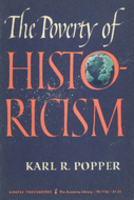The Poverty of Historicism
 |
|
| Author | Karl Popper |
|---|---|
| Country | United Kingdom |
| Language | English |
| Subject | Historicism |
| Publisher | Routledge |
|
Publication date
|
1957 |
| Media type | |
| Pages | 166 (1994 Routledge edition) |
| ISBN | (1994 Routledge edition) |
The Poverty of Historicism is a 1957 book by philosopher Karl Popper, in which Popper seeks to persuade the reader of both the danger and the bankruptcy of the idea of historicism.
The Poverty of Historicism was first written as a paper which was read in 1936, then updated and published as a book in 1957. It was dedicated “In memory of the countless men and women of all creeds or nations or races who fell victim to the fascist and communist belief in Inexorable Laws of Historical Destiny.”
The book is a treatise on scientific method in the social sciences. Popper defines historicism as: “an approach to the social sciences which assumes that historical prediction is their principal aim…”.“The belief… that it is the task of the social sciences to lay bare the law of evolution of society in order to foretell its future… might be described as the central Historicist doctrine.”.
He distinguishes two main strands of historicism, a “pro-naturalistic” approach which “favours the application of the methods of physics”, and the “anti-naturalistic” approach which opposes these methods.
The first two parts of the book contain Popper's exposition of historicist views (both pro- and anti-naturalistic), and the second two parts contain his criticism of them. Popper concludes by contrasting the antiquity of historicism (which, for example, Plato is said to have espoused) with the claims of modernity made by its twentieth century adherents.
Popper’s criticisms of the poverty of the idea of historical prediction can broadly be split into three areas: fundamental problems with the idea itself, common inconsistencies in the arguments of historicists, and the negative practical effects of implementing Historicist ideas.
i) A description of the whole of society is impossible because the list of characteristics making up such a description would be infinite. If we cannot know the whole of the present state of mankind it follows that we cannot know the future of mankind.
“If we wish to study a thing, we are bound to select certain aspects of it. It is not possible for us to observe or to describe a whole piece of the world, or a whole piece of nature; in fact, not even the smallest whole piece may be so described, since all description is necessarily selective.”
ii) Human history is a single unique event. Knowledge of the past therefore does not necessarily help one to know the future. “The evolution of life on earth, or of human society, is a unique historical process… Its description, however, is not a law, but only a singular historical statement.”
...
Wikipedia
